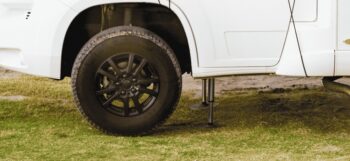Renting out your static caravan is a good way to gain some income and help with the costs of owning a holiday home. By merely providing a service, you can generate money, often referred to as passive income, from doing very little work. Sounds great – but taking the decision to do so can feel like stepping into the unknown, so we’ve put together a list of things for your consideration before you leap into any decision making.
If you have yet to purchase a static caravan, there’s a lot to think about beforehand.
The size of the caravan and whether you buy new or second-hand will greatly depend on the specification required, and ultimately your budget.
If you choose to buy second hand, you may want to check the following:
• What appliances are already fitted, and if they been regularly tested – can the seller provide a fixed electrical installation certificate?
• If the property comes with a warranty.
• If water system, boiler, and gas appliances are in good working order - can the seller provide a recent gas safety certificate?
• The condition of the doors and windows.
• If there are any visible signs of damp or mould on the interior.
If you are buying with the intention of renting out your static caravan, it’s wise to ensure that your static caravan is full of the items which could be deemed ‘essential’ or ‘useful’ to holidaymakers, to make their stay a home-from-home experience. TVs and Wi-Fi are now expected as standard, so be prepared to have both installed, if they are not included. Remember, if you have a TV in your static caravan, you must have a license to use it.
Finding a holiday park that allows subletting
Many holiday parks don’t have a problem with people renting out their static caravan, but it is important to note that there may be restrictions in place at some locations. If you already own a caravan, check your static caravan park ownership agreement, to see if there are any restrictions on renting it out. If you are yet to buy, check with the park, before you site it. There may be specific rules on pets, age groups, the number of vehicles allowed per pitch, or a rule which requires the owners to go through the site operators themselves when subletting and paying a fee for the service. For your own peace of mind, and to avoid wasting your own time, be sure to study your contract and confirm that you have the option to sublet.

Renting out independently or through a holiday park?
Most large sites and holiday park chains offer lettings services. Many people choose to use these services because of the convenience. You let the park know when you want to rent out your caravan and the park operator will do the rest. They will list your caravan on their letting’s platform, handle bookings, co-ordinate the handover of keys, schedule cleaning and reactive maintenance and deal with guest communications.
If you have the time or you’re only making the property available for limited periods, it might be entirely feasible to take care of the above yourself. If you decide to go down this route you will need to:
• Advertise.
• Keep a booking diary and deal with enquiries and guest communication promptly.
• Be available to meet and greet guests to handover keys and show them around.
• Be on hand to clean to a high standard and change bedlinen, if you provide it, before the next guest arrives.
• Be on hand to resolve any maintenance issues that could arise.
Consider your personal use
Planning is always recommended if you want to get some personal use out of your investment. While it may be tempting to reserve time for your own use in the summer months, bear in mind this is likely to be when you will see the most trade. There’s nothing to say you can’t block off some time for yourself during peak season, but just be aware that it will eat into potential profit. To prevent a loss of income, consider staying in your caravan during the off-peak season.

Dogs or no dogs?
If you want to market your static caravan to the widest audience possible, it’s worth considering allowing guests with dogs to stay in your holiday home, if the holiday park you are sited on permits this. Many people holiday in the UK as it’s easier to take their dogs with them and saves having to find a dog-sitter or money on expensive kennel fees. Most holiday parks have strict rules surrounding what you can and can’t do as a dog owner. The number of dogs that can accompany guests is often limited to two and they are expected to be well-behaved, quiet, and friendly. These rules can also be applied if you are managing your own bookings, after all, being able to take your dog on holiday is a privilege, not a right.Associated legal requirements and regulations
Associated safety requirements
As a static caravan owner, who rents to others, there are safety requirements that must be adhered to. These include, but aren’t limited to:
Certification – You must obtain an annual gas safety certificate, which must be displayed in your caravan. All electrical appliances must be PAT (Portable Appliance Testing) tested every 6 -12 months. You will receive a PAT Test certificate and each item tested will have a unique NIC EIC approved label, to prove it has been checked. Your caravan’s wiring system will need to undergo a static caravan electrical test (EICR). every three years to receive a fixed electrical installation certificate.
Safely equipment - It is a requirement to have a smoke alarm and carbon monoxide detector installed inside your caravan, if you are renting it out. You must also insure there is a fire extinguisher and fire blanket available, to be fully compliant. Full details on what guests need to do in the event of a fire emergency, should also be available.
How much should you charge for renting out your static caravan?
Before you set up bookings you need to set reasonable rates that are in line with other caravans being let on the park. Do your research by consulting parks and letting agents, if you already have a caravan, to find out what caravans of a similar spec are being let out for. Other influencing factors will include caravan size/berth, the facilities available and the condition your caravan is in. Consider your monthly running costs, such as utility bills and pitch fees. Remember, any income you make from renting out your caravan is taxable, so you will need to file self-assessment tax returns with HM Revenue and Customs for any money you make from your static caravan rental during a tax year.

Advertise your rental
If your intention is to rent out your static caravan for most of the year, then you may want to consider advertising.
Platforms such as Gumtree allow you to list for free, while Airbnb and Camplify charge fees when someone books—Camplify deducts a percentage of the booking, and Airbnb applies both host and guest fees. For broader visibility, paid advertising on websites like Static Caravan UK or Rent My Caravan may be worth considering.
When you’re advertising your caravan, it’s important to make your listing stand out. To be sure you get a captive audience you should be mindful of the following:
Take great photography – Take pictures which show the caravan inside and out. Ensure it is clean and tidy and use well place props such as a vase of flowers or wine glasses, to paint a picture. Be mindful of the lighting. Dull, dark photos won’t inspire a booking, so try to capture it on a bright, sunny day.
Use plain English - Keep the language simple. The easier the listing is to understand, the easier the decision to book will be.
Highlight the features and benefits – Let people know what’s so great about it. If you allow dogs, have a 42-inch plasma screen TV or it’s just a stone’s throw from the beach, people will want to know!
Insurance
Always contact your insurance provider before hiring out your caravan, as your standard cover may not cover lettings. As well as protecting your caravan against potential accidental damage, it's especially important to consider having public liability insurance in place, in the event of a guest injuring themselves during their stay. You may also want peace of mind that legal costs can be covered, if a guest decided to make a claim.
At Lifesure, cover for renting your static out to other holidaymakers, or your family and friends is included in our policies; you just need to let us know when you start subletting. Our insurance includes cover for accidental damage to contents, public liability cover of up to £5,000,000 and the option to add leisure home legal expenses to your policy.
Further information can be found on our Static caravan insurance page and our knowledgeable friendly team are always on hand to answer any queries you may have. Why not give us a call today on 01480 402 460.
Policy limits and exclusions may apply, please see the policy wording for full terms and conditions.
Disclaimer: The sole purpose of this article is to provide guidance on the issues covered. This article is not intended to give legal advice, and, accordingly, it should not be relied upon. It should not be regarded as a comprehensive statement of the law and/or market practice in this area. We make no claims as to the completeness or accuracy of the information contained herein or in the links which were live at the date of publication. You should not act upon (or should refrain from acting upon) information in this publication without first seeking specific legal and/or specialist advice. Arthur J. Gallagher Insurance Brokers Limited trading as Lifesure accepts no liability for any inaccuracy, omission or mistake in this publication, nor will we be responsible for any loss which may be suffered as a result of any person relying on the information contained herein.
FP117-2025











